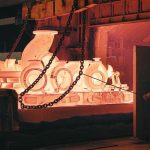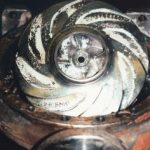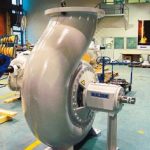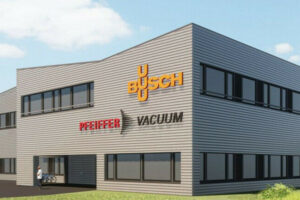Corrosion-resistant pumps are critical to many industrial processes. While some manufacturers use plastics for pump construction, the mechanical limitations of this material mean that for most applications cast metals are preferred. This article examines a high-alloy cast steel for demanding industrial processes that delivers improved performance compared to duplex types.
Arto Riihimäki, Redvers Paley
Pump manufacturers experience continuous pressure from users to extend the life of process pumps in order to reduce parts and labour costs and cut the number of unplanned shutdowns. The key to life extension is to produce pump parts from erosion and corrosion-resistant materials that nevertheless retain the properties essential for manufacturing the component. This balance is often a compromise between good corrosion resistance and adequate component strength and hardness.
High-alloy cast steels
The production of steels used in pumps has traditionally been based on the American Society for Testing and Materials (ASTM) standard, which is widely accepted throughout industry. The more recent European standard, EN 10283, also details steel grades intended for general applications. The European and ASTM standards contain many equivalent or near-equivalent steel types. Typically, pump manufacturers use these standard grades for components because they source from commercial foundries.
Sulzer Pumps is dedicated to continuous research to improve the performance of the materials it uses. In addition to these internationally recognised standard materials, it also examines materials outside the industry standards. A good example of this is the completely austenitic, highly nitrogen-alloyed and extremely corrosion-resistant Avesta 654 SMO steel. This patented material is included in neither the American or European cast steel standards.
Excellent results in tests
In the past, duplex-alloyed steels were usually easier to make than the completely austenitic, corrosion-resistant grades. Production of the latter requires an argon oxygen decarburisation (AOD) converter or, when melted in an induction furnace, raw material that has been pre-treated in an AOD converter. Highly chromium and molybdenum-alloyed steels must have both a low carbon content and an increased nitrogen content; these conflicting needs are readily achieved using AOD technology. The low sulphur content obtained with this method lends additional corrosion resistance to the material. Thanks to its modern foundry production facilities, Sulzer Pumps Finland Oy has become one of only a small number of licensed producers of 654 SMO.
Before committing to production of 654 SMO, it was important to establish its superiority over most of the common, alternative pump materials. The steel was therefore subjected to the following rigorous tests with positive results:
- Critical pitting temperature: The results prove that 654 SMO withstands pitting corrosion well. It has a critical pitting temperature almost 40 °C higher than duplex steels.
- Corrosion test: Samples were tested in an operational phosphoric acid reaction tank for a period of eleven days. In addition, a short-term abrasion test was also performed, using reaction fluid to which the abrasive substance alumina had been added. The results indicate that 654 SMO has similar abrasion resistance to duplex steels and performs better in straight immersion tests.
- Cavitation erosion test: The performance of 654 SMO is clearly superior to other materials.
Sulzer process pumps manufactured from 654 SMO have class-leading resistance to erosion and corrosion attack. Sulzer Pumps can control the entire manufacturing process – from production of the initial melt and casting parts to selection of the most appropriate design features for a particular application.
Live applications
The Kemira plant located in Siilinjärvi (Finland) produces phosphoric acid. Phosphoric acid is made by a wet process where natural phosphate rocks are immersed in sulphuric acid. Serious corrosion problems occur because of the aggressiveness of the industrial phosphoric acid and the abrasive nature of the raw pumped solution.
Kemira chose Sulzer Ahlstar WPP process pumps manufactured from 654 SMO for its production process. After three years operation a pump was inspected internally, when it proved to have withstood wear so well that the inscription 654 SMO was still clearly visible on the impeller casting.
A major Moroccan manufacturer installed a Sulzer Ahlstar WPP 61-600 pump manufactured from 654 SMO in its flash cooler circulation system (downstream of the reactor) on an experimental basis. After the completion of a six-month test period in this extremely corrosive application, the customer was so impressed by how well the pump had resisted corrosion damage that he immediately had three further units installed.
cpp 402
Share:









